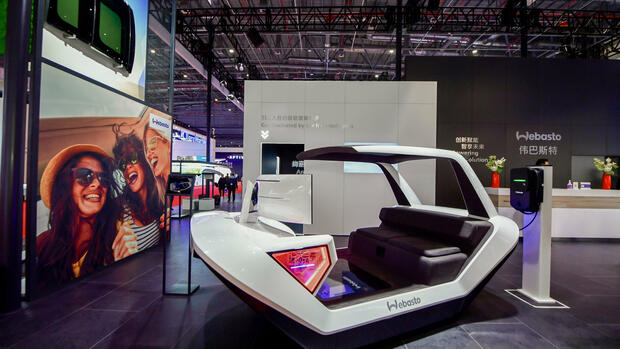The automotive supplier was able to double its sales with electromobility last year.
(Photo: obs)
Munich After two years of losses, the automotive supplier Webasto has returned to the operating profit zone. “2022 was another challenging, but also good and important year for Webasto,” said CEO Holger Engelmann on Tuesday in Munich. The company is thus leaving the burdens caused by the corona pandemic and problems with a large order from Ford behind for the time being.
The sunroof specialist’s sales increased last year by 19 percent to EUR 4.4 billion for the first time. A future-proof field is growing strongly: Revenues from products for electromobility almost doubled to 292 million euros.
With a record order intake of 7.2 billion euros, even 39 percent went to e-mobility projects. According to earlier announcements, Webasto wants to achieve sales of more than one billion euros in this area by 2025.
The manufacturers earn splendidly, the suppliers are under pressure
Other suppliers had recently made progress in the transition towards electromobility. ZF announced a record order backlog of more than 30 billion euros for e-drives. Bosch is also doing good business with Chinese electric car suppliers, for example.
However, the suppliers have to invest heavily in new technologies in advance. That squeezes their margins, while car manufacturers make good money: BMW, for example, posted record profits of almost 19 billion euros in 2022.
Webasto boss Engelmann emphasized that in the near future there will be a particular focus on cost management. Investments fell last year by seven percent to 262 million euros. But that was also due to the fact that heavy investments had been made beforehand, including in new plants. The Stockdorfer group slightly increased its research and development expenses to 329 million euros.
Engelmann was cautious when looking ahead to the current year. There are still large fluctuations in product calls and increased costs that cannot be fully passed on to customers.
“In addition, the increasing political tensions are causing us great concern.” Webasto is doing everything possible to “maintain its profitability in 2023 and achieve a positive result”. But this is an extremely ambitious goal. According to the announcement, Webasto again achieved a positive return on sales before interest and taxes of 2.5 percent last year.
In the corona pandemic, Webasto had to struggle, just like the entire car industry did in the beginning. At the sunroof specialist, however, home-made problems arose with a large order from Ford.
The false start in the USA cost Webasto dearly
For the new edition of the legendary Ford Bronco, the US car manufacturer selected Webasto as the supplier for several roof variants of the off-road vehicle. The company hoped for sales of two billion euros over the full term of the model.
However, everything that could go wrong with the major order initially went wrong. The new Webasto plant in Detroit opened late, Ford had to postpone the first deliveries and replace thousands of hardtop roofs because of quality problems. Because of the charges in the three-digit million range, Webasto made a loss before interest and taxes of 146 million euros in 2021.
Webasto is one of the 15 largest German automotive suppliers and is fully family-owned. The company became known to a broader public because the first corona case in Germany occurred there. The group’s crisis management was widely praised.
The company specializes primarily in glass panorama roofs and parking heaters. Electromobility is to be expanded as a further mainstay in the coming years. The supplier develops batteries and charging solutions for the original equipment of electric cars and charging stations.
Experts expect imbalances in the supplier industry
The transition to electromobility is a major challenge for many automotive suppliers. Other companies that supply parts for the combustion engine, for example, have an even harder time than Webasto. The experienced renovator Hans-Joachim Ziems, who currently runs the ailing wiring system specialist Leoni, therefore believes that automotive suppliers could get into trouble.
“Some suppliers will still get into trouble because their products – unlike Leoni – are no longer sustainable in the transformation to electromobility,” Ziems told the Handelsblatt. “Everyone involved would have to sit down at a table and think about how to slow down dying”.
More: The automotive supplier Brose complains of a lack of employee motivation
